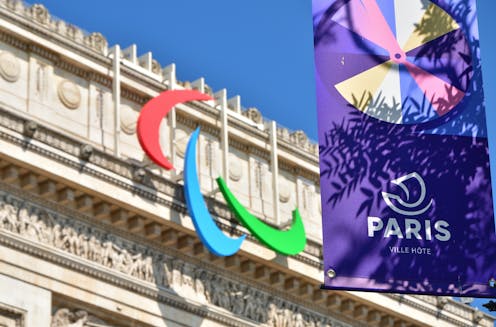
As the Paralympic Games come to an end with the closing ceremony, it’s an opportune moment to reflect back on the messaging behind the event. The International Paralympic Committee (IPC) promoted the Games as an inclusive event that enhances opportunities for people who experience disability globally.
At a recent United Nations conference on inclusion, held just prior to the start of the Paris 2024 Games, IPC President Andrew Parsons stated:
“We have the perfect platform to bring the important decision-makers and persons of influence to the table for the first time to really leverage the incredible power of the Paralympics to create a more inclusive world.”
But while striving for inclusivity is an admiral goal, actually achieving it is not a straightforward task. While the Paralympic Games are more inclusive than the Olympics, para sport’s classification system does not allow for all people who experience disabilities to participate.
As a result, some athletes with disabilities are excluded from the Paralympics. For example, athletes who are deaf but physically able are excluded from the Paralympics. Instead, they might compete in the Deaflympics, an event that is 100 years old this year, but doesn’t receive the same level of visibility or media coverage as the Paralympics.
The IPC’s strategy of using inclusivity as a marketing tool has undoubtedly increased the visibility and profile of the Paralympics and brought more attention to the achievements of athletes with disabilities. But its claims of inclusivity are false and may ultimately become a problem in the future.
Inherently exclusionary
Parasport is exclusionary on two fronts. Firstly, the classification system — a cornerstone of para sport — is inherently exclusionary because not all athletes who experience disability are eligible. Because the system categorizes athletes based on specific impairments, some are inevitably left out.
Secondly, even for those who are eligible to compete, the opportunity to participate can be limited by the sport-specific classification systems. In others words, some sports within the para sport system are themselves exclusionary.
The larger problem at play is that marketing para sport as inclusive can be damaging to the status of Paralympic athletes. The Paralympics, like other elite sports events, are exclusionary by nature, and not everyone makes the cut.
Read more: Why sport must be (re)imagined in ways that make it more accessible for all disabled athletes
Factors like injuries or the ever-increasing high qualification standards can prevent even the most talented athletes from competing. This includes a pressure on athlete numbers imposed by the agreement between the International Olympic Committee and the IPC that controls how big the Paralympic Games can be.
Selling the Paralympics as inclusive devalues the achievements of the most highly gifted athletes who fit within the classification system. Suggesting that anyone can compete diminishes the prestige of the event, making it seem no more significant than winning a casual race at a community event.
If the Paralympic Games were truly inclusive, it would mean there are no performance criteria for athletes with qualifying impairments, allowing anyone to participate. In reality, the Paralympic Games are not fully inclusive, and labelling them as such is misleading.
Overshadowing grassroot sports
At the 2021 Paralympic Games in Tokyo, the IPC jointly launched the #Wethe15 movement, a campaign raising awareness about people with disabilities. Selling the Paralympics as inclusive sport aligns with the IPC’s long-standing mission to be recognized as a high-performance sports organization — something that has been part of its agenda since at least 1992.
While the goal of inclusion is commendable, it can lead to unrealistic expectations about parasport, especially for those who aren’t familiar with the field. The Paralympic Games dominate the media landscape and overshadow other types of disability sport, creating a skewed perception of the broader disability sports landscape.
Disability sport is much broader than parasport; international events like the Special Olympics and the Deaflympics are both large disability sporting events that fall outside the IPC’s influence and deserve just as much attention.
The increased media focus every two years on the Olympic and Paralympic Games often causes people to overlook grassroots disability sport. These grassroot sports are incredibly diverse and serve a wide range of abilities and needs, but they are also underdeveloped and less visible compared to the Paralympics.
Powerchair soccer, for example, has seen international growth in recent years, while the track discipline of frame running caters to athletes with high support needs.
While sentiments about inclusivity are well-meaning, the way inclusivity is portrayed through high-profile events like the Paralympics is misleading. Like the IPC, the mission of Canadian Paralympic Committee also states:
“Guided by the vision of creating a more inclusive world, we work tirelessly to prepare our athletes for excellence in competition and to foster communities where inclusivity is not just encouraged — it’s celebrated.”
The so-called profound impact of the Paralympic Games is largely based on a false understanding of the culture and potential of high-performance disability sport.
The para sport movement, both in Canada and internationally, needs to get back to championing their virtue as a high-performance sporting practice that should be seen as equal to, yet distinct from, the Olympics. It doesn’t need to rely on misleading claims of inclusivity to gain recognition.
P. David Howe does not work for, consult, own shares in or receive funding from any company or organisation that would benefit from this article, and has disclosed no relevant affiliations beyond their academic appointment.
This article was originally published on The Conversation. Read the original article.







